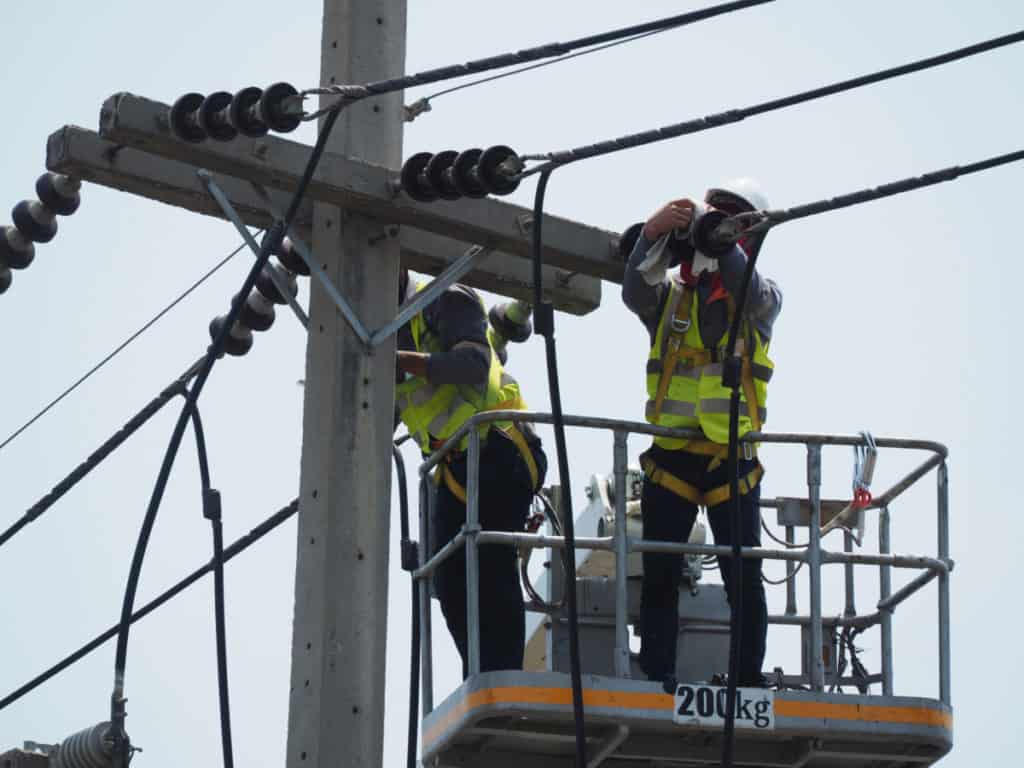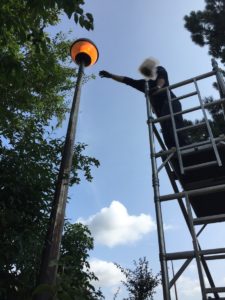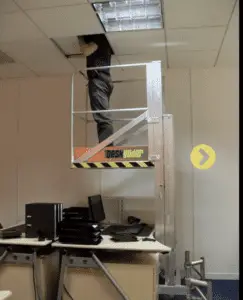I’ve been watching some electricians on site climbing to the top of those huge wooden poles to make repairs the power lines. If your anything like me the idea of strapping on a pair of spiked boots and making your way up the pole is terrifying!
This got me thinking about do all electricians have to work at height and what happens to those electricians who are scared of heights?

All electricians have to work at height. General electricians usually work within 5 metres of the ground but specialist electricians (such as an overhead linesmen and women) have to work a lot higher. Electricians who are scared of heights need not worry though as they are not alone.
This article will use my experience (and a little survey of other electricians) to explain the different working heights you’ll need to be comfortable at if you want to be an electrician. However, don’t worry if you are scared of heights, most of us stay pretty close to the ground.
First let’s get the big question out the way.
Can You Be an Electrician if You’re Scared of Heights?
General electricians often work from step ladders or small access towers. This means regularly having our feet up to 5 metres from ground level. If you are not scared working at this height then you can absolutely become an electrician.
I decided to poll colleagues and other electricians to find out if any of them where scared or even uncomfortable at heights. I did guess in advance some of their answers as I have had first hand experience of watching a few of them refuse to let go of the handrails.
The table below shows the results of this survey.
| Are You Scared of Working at Heights Above 5 metres? | Number of Electricians |
|---|---|
| No, I love heights | 5 |
| I’m OK with heights | 13 |
| I’m uncomfortable at heights | 3 |
| I’m scared of heights | 1 |
Our survey showed that 18% of qualified electricians described themselves as uncomfortable or scared working at heights above 5 metres.
It’s worth noting that all electricians surveyed said that they regularly work using step ladders and other equipment.

I read from this data that being scared of heights doesn’t stop someone from becoming an electrician so long as they are willing to work on a step ladder at around ceiling height.
Whilst on occasion electricians need to work higher than step ladder hight (by using various other access methods such as scaffolds) it doesn’t affect their ability to do their job well. In these instances most electricians can face their fears or are able to find a more willing colleague.
In my experience, those electricians scared of heights find it very difficult to hide it as they usually can’t let go of the hand rail. Apart form a little light hearted ‘banter’ no one gets annoyed as being scared of heights is a common issue (apparently affecting 3% – 6% of people according to this article)
Another point to remember is being scared of heights is relative to each person. I’m ok carrying out a high level job such as repairing a street light; but I wouldn’t want to be working on a scaffold half way up the side of Big Ben!
Do Electricians Climb Poles?
General electricians do not climb poles. Only specialist electricians who have been fully trained, such as an overhead lines person, will climb poles. General electricians can still work at a similar or greater height but they use different access methods.
Overhead lines electricians are the ones that you may have seen at the top of electricity poles outside in all weathers in order to repair the power lines. As well as having to work high up, they often have to do it in less favourable weather as they are at their busiest after a storm has disrupted the power supply.
Assuming you want to be an electrician working in domestic houses or small commercial premises you will never have to climb a pole. Overhead linesmen and women work for the power distribution company and have years of specialist training to carry out this work.
So if we’re not out there climbing poles let’s take a brief look at some of the access equipment we use for working at high level.
Methods Electricians Use for Working at Height
The working at height regulations dictate that the safest way possible must be found for working at high level. Fortunately there are so many types of access equipment available to help electricians, each one suited to a different task.
The table below shows the different equipment we use and the height of work that they are suitable for.
| Type of equipment used for working at high level | Typical working height in metres |
|---|---|
| Step Ladder | 1 – 3 |
| Desk Surfer | 1-3 |
| Podium Steps | 1 – 2 |
| Ladder | 1 – 4 |
| Access Tower | 3 – 10 |
| MEWP | 6 – 51+ |
Step ladders: Electricians regularly climb step ladders and is one of the most common pieces of equipment used for working at heigh level.
Desk Surfer: A cool sounding piece of equipment and very useful. An electrician will use a desk surfer to get access to a ceiling above a desk without having to move the desk out of the way.
Ladder: Although not as popular as step ladders due to safety limitations, electricians will climb ladders if needed, usually to access another area (such as to climb up onto scaffolding)
Access Tower: Electricians use an access tower (tower scaffolding) when they need to work at heigh level for an extended period of time. It has the advantage of being manoeuvrable and lightweight.
MEWP: Mobile Elevated Work Platforms are often used by electricians to provided powered access to high level work. These are a great option for getting especially high but specialist training course is required (IPAF) before being allowed to operate.

Some electricians I’ve come across (like in the ones surveyed above) are ok on the lower level equipment but refuse to work in a MEWP because they don’t like being that high up. In my experience the companies I’ve worked for are ok with this and they just select another volunteer.
These are the main types of access equipment electricians and other tradesmen use to work at heigh level. The method chosen depends on the height required and safety factors. For example, if needing to work at a height of 10 metres it’s far safer to use scaffolding compared with a massive step ladder!
The best access method to use is decided in a risk assessment and then a permit is requested. Sometimes carrying out work at weekends when less bystanders are around.
Do You Need a Permit to Work at Height?
Whether or not a working at height permit is needed is decided by the company who are employing the tradesmen. In most cases an employer will want to issue a working at height permit where there is any danger of a fall regardless of the height.
The HSE contains lots of documentation that we can use to help us work at hight safely, linked here.
A working at height permit is a document issued by the company to the electrician who’s carrying out the work. Its purpose is to give the electrician permission to work at high level.
Permits can be required to use step ladders regardless of how small they are if it’s part of the safety policy of that employer. Some sites go as far as to ban step ladders as they see them as unsafe.
Working on a MEWP, scaffolding or ladder will require a working at height permit in most instances. Building sites vary when it comes to step ladders but more and more sites are issuing working at height permits for these.
I hope that’s covered the basics of working at height if you want to learn about if electricians work alone or in pairs you can read that article linked here

